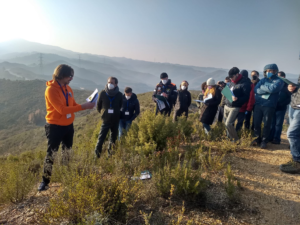 On the 18th – 19th and 20th January 2022, Euromontana participated to the kick-off meeting in Solsona (Spain) of the Horizon 2020 research project FIRE-RES. This project aims to boost the socio-ecological transition of the European Union towards a fire-resilient continent by developing a stream of innovation actions.
On the 18th – 19th and 20th January 2022, Euromontana participated to the kick-off meeting in Solsona (Spain) of the Horizon 2020 research project FIRE-RES. This project aims to boost the socio-ecological transition of the European Union towards a fire-resilient continent by developing a stream of innovation actions.
A new paradigm to fire management
During the meeting, Antoni Trasobares, Director of the Forest Science and Technology Centre of Catalonia (Spain) and coordinator of the FIRE-RES project, stated “Extreme fire events have new features that are not totally understood. We need to integrate fire management and landscape management.” As Mr. Trasobares added “Classical sequential approach needs to be changed to an interactive format via innovation actions.” Presentations and discussion focused on FIRE-RES methodology and how it will develop an integrated fire management approach to tackle extreme wildfires. Key interventions from leading experts, such as David Martell, Marc Finney and Philip Seguele, as well as policymakers provided a complex view on the ongoing challenges related to extreme wildfire events.
A focus on developing and deploying innovations
 “Living Labs and Innovation Actions are at the core of FIRE-RES” stated Irina Profokieva from the Forest Science of Technology Centre of Catalonia. More than 34 innovations that will be developed by FIRE-RES partners and tested in the 11 Living Labs. During these days, partners could present their innovation actions and how these will be grounded into the Living Labs in Catalonia, Galicia, Portugal, Nouvelle Aquitaine, Sardinia, Netherlands-Germany, Norway-Seweden, Canary Islands, Bulgaria, Greece. Moreover, on 20th January, the FIRE-RES partners visited two burnt areas in Catalonia, Spain. These are the territories affected by the Odena Fire in 2015, and the Santa Coloma de Queralt Fire (2021).
“Living Labs and Innovation Actions are at the core of FIRE-RES” stated Irina Profokieva from the Forest Science of Technology Centre of Catalonia. More than 34 innovations that will be developed by FIRE-RES partners and tested in the 11 Living Labs. During these days, partners could present their innovation actions and how these will be grounded into the Living Labs in Catalonia, Galicia, Portugal, Nouvelle Aquitaine, Sardinia, Netherlands-Germany, Norway-Seweden, Canary Islands, Bulgaria, Greece. Moreover, on 20th January, the FIRE-RES partners visited two burnt areas in Catalonia, Spain. These are the territories affected by the Odena Fire in 2015, and the Santa Coloma de Queralt Fire (2021).
Would you like to know more?
To learn more about the FIRE-RES project, read our latest item of news or follow the project on its social media channels (Facebook, Twitter, LinkedIn).
![]() This project has received funding from the European Union Horizon 2020 research and innovation programme under grant agreement No. 101037419.
This project has received funding from the European Union Horizon 2020 research and innovation programme under grant agreement No. 101037419.










